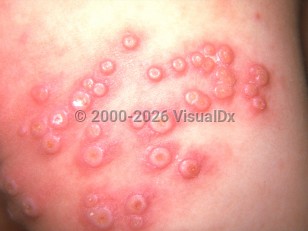Potentially life-threatening emergency
Eczema vaccinatum vaccinia in Infant/Neonate
Alerts and Notices
Important News & Links
Synopsis

Children and infants with atopic dermatitis or eczema (active or healed) or rarely other inflammatory skin diseases are at great risk from accidental implantation of smallpox vaccination (vaccinia) virus onto eczematous skin, which can result in severe illness.
The Advisory Committee on Immunization Practices (ACIP) advises that infants younger than 12 months should not get the smallpox vaccine. In addition, ACIP advises against non-emergency use of smallpox vaccine in children under 18. However, transfer of vaccinia virus can occur from contact with a smallpox vaccinee whose vaccination lesion is in the florid stages.
The disrupted skin of atopic dermatitis patients permits the viral implantation. Once the virus is implanted (and it may be implanted at multiple sites), it spreads from cell to cell, producing extensive lesions dependent only on the extent of the abnormal skin. An underlying T-cell immunologic defect is suspected in some patients with atopic eczema on the basis of their propensity to develop cutaneous viral and fungal infections and a decreased sensitivity to contact dermatitis, which is T-cell mediated.
Untreated patients become quite ill and experience systemic symptoms. Bacteremia and septicemia may result from local contamination or frank infection of the site, at which time the patient will experience fever, chills, obtundation, and even coma. If unrecognized and untreated, the patient will manifest severe systemic symptoms resembling septic shock, and death ensues.
The Advisory Committee on Immunization Practices (ACIP) advises that infants younger than 12 months should not get the smallpox vaccine. In addition, ACIP advises against non-emergency use of smallpox vaccine in children under 18. However, transfer of vaccinia virus can occur from contact with a smallpox vaccinee whose vaccination lesion is in the florid stages.
The disrupted skin of atopic dermatitis patients permits the viral implantation. Once the virus is implanted (and it may be implanted at multiple sites), it spreads from cell to cell, producing extensive lesions dependent only on the extent of the abnormal skin. An underlying T-cell immunologic defect is suspected in some patients with atopic eczema on the basis of their propensity to develop cutaneous viral and fungal infections and a decreased sensitivity to contact dermatitis, which is T-cell mediated.
Untreated patients become quite ill and experience systemic symptoms. Bacteremia and septicemia may result from local contamination or frank infection of the site, at which time the patient will experience fever, chills, obtundation, and even coma. If unrecognized and untreated, the patient will manifest severe systemic symptoms resembling septic shock, and death ensues.
Codes
ICD10CM:
T88.1XXA – Other complications following immunization, not elsewhere classified, initial encounter
SNOMEDCT:
238368001 – Eczema vaccinatum
T88.1XXA – Other complications following immunization, not elsewhere classified, initial encounter
SNOMEDCT:
238368001 – Eczema vaccinatum
Look For
Subscription Required
Diagnostic Pearls
Subscription Required
Differential Diagnosis & Pitfalls

To perform a comparison, select diagnoses from the classic differential
Subscription Required
Best Tests
Subscription Required
Management Pearls
Subscription Required
Therapy
Subscription Required
References
Subscription Required
Last Updated:07/15/2018
Potentially life-threatening emergency
Eczema vaccinatum vaccinia in Infant/Neonate

